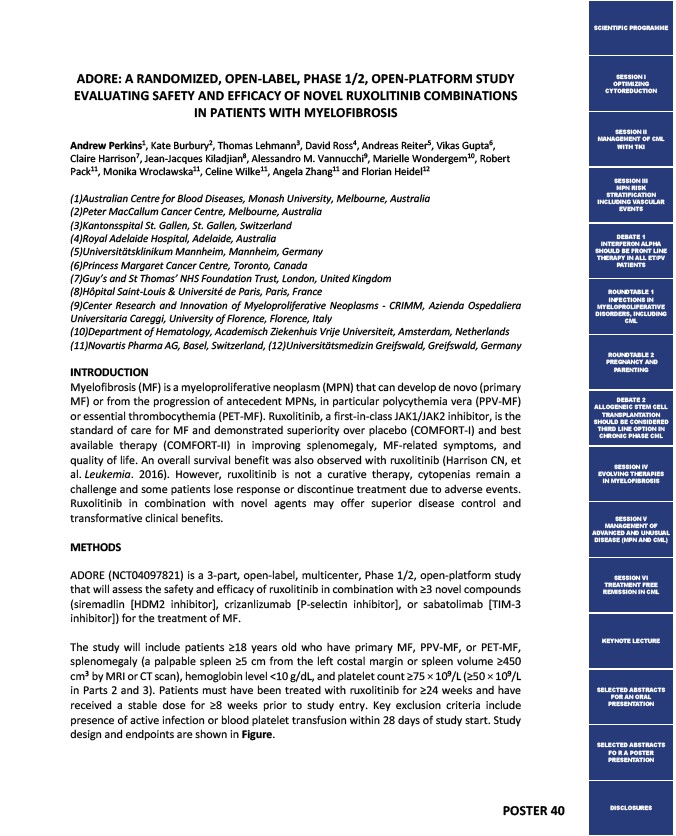
ADORE: A RANDOMIZED, OPEN-LABEL, PHASE 1/2, OPEN-PLATFORM STUDY
EVALUATING SAFETY AND EFFICACY OF NOVEL RUXOLITINIB COMBINATIONS
POSTER 40
IN PATIENTS WITH MYELOFIBROSIS
Andrew Perkins1, Kate Burbury2, Thomas Lehmann3, David Ross4, Andreas Reiter5, Vikas Gupta6,
Claire Harrison7, Jean-Jacques Kiladjian8, Alessandro M. Vannucchi9, Marielle Wondergem10, Robert
Pack11, Monika Wroclawska11, Celine Wilke11, Angela Zhang11 and Florian Heidel12
(1)Australian Centre for Blood Diseases, Monash University, Melbourne, Australia
(2)Peter MacCallum Cancer Centre, Melbourne, Australia
(3)Kantonsspital St. Gallen, St. Gallen, Switzerland
(4)Royal Adelaide Hospital, Adelaide, Australia
(5)Universitätsklinikum Mannheim, Mannheim, Germany
(6)Princess Margaret Cancer Centre, Toronto, Canada
(7)Guy’s and St Thomas’ NHS Foundation Trust, London, United Kingdom
(8)Hôpital Saint-Louis & Université de Paris, Paris, France
(9)Center Research and Innovation of Myeloproliferative Neoplasms - CRIMM, Azienda Ospedaliera
Universitaria Careggi, University of Florence, Florence, Italy
(10)Department of Hematology, Academisch Ziekenhuis Vrije Universiteit, Amsterdam, Netherlands
(11)Novartis Pharma AG, Basel, Switzerland, (12)Universitätsmedizin Greifswald, Greifswald, Germany
INTRODUCTION
Myelofibrosis (MF) is a myeloproliferative neoplasm (MPN) that can develop de novo (primary
MF) or from the progression of antecedent MPNs, in particular polycythemia vera (PPV-MF)
or essential thrombocythemia (PET-MF). Ruxolitinib, a first-in-class JAK1/JAK2 inhibitor, is the
standard of care for MF and demonstrated superiority over placebo (COMFORT-I) and best
available therapy (COMFORT-II) in improving splenomegaly, MF-related symptoms, and
quality of life. An overall survival benefit was also observed with ruxolitinib (Harrison CN, et
al. Leukemia. 2016). However, ruxolitinib is not a curative therapy, cytopenias remain a
challenge and some patients lose response or discontinue treatment due to adverse events.
Ruxolitinib in combination with novel agents may offer superior disease control and
transformative clinical benefits.
METHODS
ADORE (NCT04097821) is a 3-part, open-label, multicenter, Phase 1/2, open-platform study
that will assess the safety and efficacy of ruxolitinib in combination with ≥3 novel compounds
(siremadlin HDM2 inhibitor, crizanlizumab P-selectin inhibitor, or sabatolimab TIM-3
inhibitor) for the treatment of MF.
The study will include patients ≥18 years old who have primary MF, PPV-MF, or PET-MF,
splenomegaly (a palpable spleen ≥5 cm from the left costal margin or spleen volume ≥450
cm3 by MRI or CT scan), hemoglobin level <10 g/dL, and platelet count ≥75 × 109/L (≥50 × 109/L
in Parts 2 and 3). Patients must have been treated with ruxolitinib for ≥24 weeks and have
received a stable dose for ≥8 weeks prior to study entry. Key exclusion criteria include
presence of active infection or blood platelet transfusion within 28 days of study start. Study
design and endpoints are shown in Figure.
SCIENTIFIC PROGRAMME
SESSION I
OPTIMIZING
CYTOREDUCTION
SESSION II
MANAGEMENT OF CML
WITH TKI
SESSION III
MPN RISK
STRATIFICATION
INCLUDING VASCULAR
EVENTS
DEBATE 1
INTERFERON ALPHA
SHOULD BE FRONT LINE
THERAPY IN ALL ET/PV
PATIENTS
ROUNDTABLE 1
INFECTIONS IN
MYELOPROLIFERATIVE
DISORDERS, INCLUDING
CML
ROUNDTABLE 2
PREGNANCY AND
PARENTING
DEBATE 2
ALLOGENEIC STEM CELL
TRANSPLANTATION
SHOULD BE CONSIDERED
THIRD LINE OPTION IN
CHRONIC PHASE CML
SESSION IV
EVOLVING THERAPIES
IN MYELOFIBROSIS
SESSION V
MANAGEMENT OF
ADVANCED AND UNUSUAL
DISEASE (MPN AND CML)
SESSION VI
TREATMENT FREE
REMISSION IN CML
KEYNOTE LECTURE
SELECTED ABSTRACTS
FOR AN ORAL
PRESENTATION
SELECTED ABSTRACTS
FO R A POSTER
PRESENTATION
DISCLOSURES